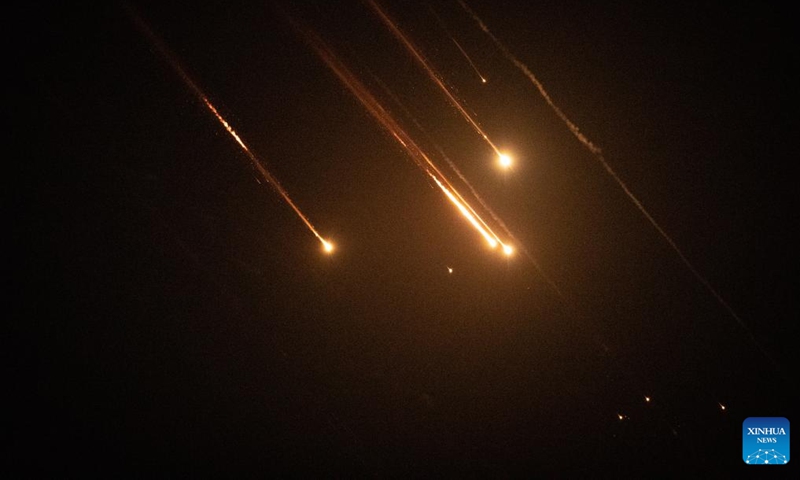
Projectiles from Iran fly through the sky above Jerusalem, on Oct. 1, 2024. (Xinhua/Chen Junqing)
China is deeply concerned over the turmoil in the Middle East and is calling for a "major country" with influence to play its due role to prevent a spillover of the crisis, said the Chinese Foreign Ministry on Wednesday, as Israel, with support or tolerance from the US, intends to retaliate significantly against Iran. This has brought increasing concern among the international community that a loss of control over the situation could spiral into an all-out war in the Middle East.
Chinese Foreign Ministry spokesperson Mao Ning said at a routine press conference on Wednesday that "We oppose moves that fuel antagonism and expand conflict, and call on all parties to handle the current situation with a calm, rational and responsible attitude in the interest of peace and stability in the region. The international community, especially major countries with influence, needs to play a constructive role and avoid further turmoil."
"To end this conflict, we need political will and diplomatic efforts, not weapons, ammunition and unilateral sanctions. Major country needs to play its due role, be objective and just, take the lead in observing international law, and make positive efforts to end the fighting as soon as possible, put the situation under control and prevent a spillover of the crisis," Mao remarked on Wednesday.
Mao's remarks came in response to a question about US military aids to Israel and whether potential Israeli strikes against Iran could target oil production facilities, nuclear facilities and other strategic sites inside Iran.
In an hours-long security meeting in Tel Aviv Tuesday night, Israeli Prime Minister Benjamin Netanyahu came to key decisions — along with his top ministers, security and military officials — about the impending Israeli attack on Iran, according to an Israeli official, The Times of Israel reported on Wednesday.
Tehran has said that "any attack from Israel will be met with a firm response," media reported. Iran launched nearly 200 ballistic missiles at Israel on October 1 in what Tehran said was retaliation for the killings of top Hezbollah and Hamas officials and a senior military commander of the Iran Islamic Revolutionary Guard Corps.
After this, Israel vowed to strike back. US President Joe Biden said on October 2 that Israel has the right to hit back, and Washington and its allies agreed to sanction Iran over the missile attack, media reported.
Experts said the "major country with influence" mentioned by the Chinese Foreign Ministry spokesperson refers to the US without any doubt. According to Reuters, Biden was expected to speak on Wednesday with Israeli Prime Minister Benjamin Netanyahu, with the conversation set to include discussion of any plans to strike Iran, according to a person familiar with the matter.
However, Biden also warned Israel not to bomb Iran's nuclear sites, saying any response from Israel should be "proportionate" to the Iranian attack on Israel last week, essentially acknowledging that some counterstrike is appropriate, according to The New York Times.
The latest conflict between Iran and Israel, as well as Israel's bloody operation in Lebanon and other regional countries have proven that the current Palestinian-Israeli conflict that started on October 7, 2023 has escalated to the entire region. This risks another all-out war in the Middle East, but the main reason why the international community has failed to prevent this escalation is due to the US' one-sided policy which has enabled the situation to get worse and worse, Liu Zhongmin, a professor at the Middle East Studies Institute of Shanghai International Studies University, told the Global Times on Wednesday.
Without the US support and tolerance toward Israel, the conflict would not have been able to escalate into such a terrible situation, experts noted.
Mao said at the Wednesday press conference that "The Palestinian-Israeli conflict has been protracted for over a year, causing the death of over 40,000 people in Gaza, most of whom are women and children. The international community has agreed on the need to de-escalate tensions, end the fighting and violence, protect civilians and avoid humanitarian disaster."
Unfortunately, the US is still sponsoring Israel's deadly military operations in the region. Israel said on September 26 that it had secured an $8.7 billion aid package from the US to support its "ongoing military efforts and to maintain a qualitative military edge in the region," Reuters reported.
Wang Jin, director of the Israeli Studies Program and Center at Northwestern University in Xi'an, told the Global Times on Wednesday that "at this moment, Israel is yet to launch a strike against Iran, as it's waiting to see the US' stance." The Biden administration does not want an escalation, and Iran also has no intention to further escalate, so if Israel chooses not to strike Iran, an escalation can be prevented. But if Israel attacks Iran, the situation is highly likely to spiral out of control, Wang noted.




